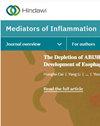Canonical Wnt/β-Catenin 通路在致病细菌诱发的炎症反应中的保护作用
IF 4.4
3区 医学
Q2 CELL BIOLOGY
引用次数: 0
摘要
炎症是宿主对各种疾病相关病原体的复杂防御反应。炎症的基线程度本应与一系列免疫调节过程密切相关,从而保护宿主机体免受病原体的入侵;但事实上,失控的炎症级联才是造成宿主损伤的主要因素,这表明负反馈机制在炎症的调节过程中有着不可或缺的重要作用。迄今为止积累的证据表明,典型的 Wnt/β-catenin 通路通过不同的机制对微生物引发的炎症有抑制作用,尽管这种抑制作用取决于细胞环境、刺激类型和细胞因子环境。由于 Wnt/β-catenin 通路具有重要的抗炎特性,因此了解其激活的确切方式尤为重要。据推测,炎症环境是启动和激活这种信号传导的必要条件,这意味着 Wnt 的活性负责保护组织免受压倒性炎症的侵袭,从而维持平衡的生理状态以抵御细菌感染。这篇综述汇集了最近为阐明 Wnt/β-catenin 信号如何调节细菌感染时的抗炎反应及其与其他炎症信号相互作用的机理细节所做的努力。还需要对不同疾病进行进一步的临床试验。本文章由计算机程序翻译,如有差异,请以英文原文为准。
A Protective Role of Canonical Wnt/β-Catenin Pathway in Pathogenic Bacteria-Induced Inflammatory Responses
Inflammation is a complex host defensive response against various disease-associated pathogens. A baseline extent of inflammation is supposed to be tightly associated with a sequence of immune-modulated processes, resulting in the protection of the host organism against pathogen invasion; however, as a matter of fact is that an uncontrolled inflammatory cascade is the main factor responsible for the host damage, accordingly suggesting a significant and indispensable involvement of negative feedback mechanism in modulation of inflammation. Evidence accumulated so far has supported a repressive effect of the canonical Wnt/β-catenin pathway on microbial-triggered inflammation via diverse mechanisms, although that consequence is dependent on the cellular context, types of stimuli, and cytokine environment. It is of particular interest and importance to comprehend the precise way in which the Wnt/β-catenin pathway is activated, due to its essential anti-inflammatory properties. It is assumed that an inflammatory milieu is necessary for initiating and activating this signaling, implying that Wnt activity is responsible for shielding tissues from overwhelming inflammation, thus sustaining a balanced physiological condition against bacterial infection. This review gathers the recent efforts to elucidate the mechanistic details through how Wnt/β-catenin signaling modulates anti-inflammatory responses in response to bacterial infection and its interactions with other inflammatory signals, which warrants further study for the development of specific interventions for the treatment of inflammatory diseases. Further clinical trials from different disease settings are required.
求助全文
通过发布文献求助,成功后即可免费获取论文全文。
去求助
来源期刊

Mediators of Inflammation
医学-免疫学
CiteScore
8.70
自引率
0.00%
发文量
202
审稿时长
4 months
期刊介绍:
Mediators of Inflammation is a peer-reviewed, Open Access journal that publishes original research and review articles on all types of inflammatory mediators, including cytokines, histamine, bradykinin, prostaglandins, leukotrienes, PAF, biological response modifiers and the family of cell adhesion-promoting molecules.
 求助内容:
求助内容: 应助结果提醒方式:
应助结果提醒方式:


